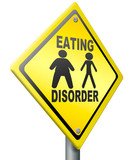
The condition usually develops around the age of 16-17. An estimated 10 million men and 20 million women in the US alone suffer from some form of eating disorder or the other, and at least half succumbing to the deadly illness.
It is classified solely as a mental illness, as it not only involves considerable psychological impairment and distress, but is also associated with a wide range of serious medical complications which can affect vital organs of the body. The mortality rate for people with eating disorders is the highest among all psychiatric illnesses, and over 12 times higher in comparison with people without eating disorder.
People with an eating disorder will often be diagnosed with an underlying mental health problem. A high level of co-morbidity has been observed among such individuals. Eating disorders are accompanied by anxiety, and depression. However, substance abuse and personality disorders have been found prevalent in most cases.
Nina Vucetic (a former eating disorder sufferer) has been recovered from all eating disorders including anorexia, bulimia, binge eating, compulsive exercise, compulsive overeating and body dysmorphic disorder for over 7 years. You might be interested to visit her blog that is dedicated to help you understand and address your concerns about eating disorders. If you are concerned about your loved one with an eating disorder, I hope this reading material guides you towards preventive measures and treatment.
Leave A Comment